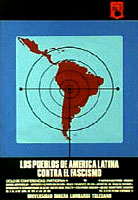Research Issues

Universidad Obrera Lombardo Toledano (1975)
In Latin America, as in everywhere, those interested in the study of labour have been facing hard times; this being the outcome of a complex picture.
To begin with, the neo-liberal wave has neglected labour as a distinctive subject of research. On one side it has been considered as passive victim of structural adjustment policies/studies. On the other side it has been reduced to a managerial oriented perspective. Then unsurprisingly, new academic fashions started to replace labour by themes with bigger institutional and financial purchase. Even worse, labour studies had become stereotype and the labour movement was in retreat. In this context, labour studies in on Latin America decreased and the Continent lost in the academic circles part of its previous appeal.
At the same time important streams of social mobilisation flowed from outside the river of traditional labour movement. Thus, they were mainly approached through a perspective that tended to underestimate its direct connection with the world of labour. The increasing dis-articulation of formal labour and the growing relevance of marginalised groups promoted a framework reminiscent of that of the social movement literature. However, in our view, it is important to stress once more that these new phenomena have to be analysed from a perspective in which labour, that is the capacity of material reproduction, remains the fundamental social relation. The direct connection between labour and social mobilisation seems evident if we look at Latin America: Piqueteros in Argentina, Partido dos Trabalhadores and Movimento dos Trabalhadores Rurais sem Terra in Brazil, Zapatistas in Mexico, or indigenous mobilisation in Bolivia and Ecuador. All these events emphasise the centrality of labour in the understanding of the social world.
Thus, LabourAgain aligns itself with those who have not given up taking labour as its main focus; LabourAgain attempts to contribute the revitalisation of labour and social mobilisation studies; LabourAgain aims to fulfil this ambition through the following research issues:
a- Industrial relations and the study of formal labour:
- Workplace Studies: the dynamic of social relations and conflict at workplace level, workers resistance and accommodation to new managerial practises, labour process studies, workplace organisation of workers, culture and politics at the workplace.
- Labour Subjectivity: identity, ideology and class consciousness.
- Gender, ethnic and migrant division of labour: working conditions, group identity and labour consciousness, and the segmentation of the labour market.
- Industrial Relations Systems: changes under neoliberal globalisation, the politics of collective bargaining, and the development of the employment relationship.
- Trade Unions: new trends and strategies in trade unions organisations and politics, international alliances and future perspectives.
b- The Informatisation of Production
- Impact of information technologies on the organisation of labour.
- New labour in the informatic and communicational sector: teleworking, computerised and telematic networks, and high-tech work.
- Immaterial labour: the role of knowledge and new information technologies.
c- Rural labour and informal sector
- Rural labour: wage labour, peasants' movements, community participation and community work, and agrarian livelihoods.
- Urban informal sector: self-employment, rural-urban migration of the labour force, dynamics of the informal labour market, the specificity of female labour in the informal sector.
- The bottom line: homeworkers and subcontracted labour, household and domestic work, child labour, unfree labour.
d- Social mobilisation
- Workers mobilisation in the formal sector
- Rural labour conflicts and mobilisation: peasants and indigenous movements, rural violence and struggle for land ownership.
- Movements and Mobilisation around the gender, ethnic and migrant division of labour: rural and urban developments.
- In and out of the labour market: social protest of the unemployed and their organisational strategies.
- Self-organisation of production: seized factories, the cooperative movement, community solidarity alternatives, barter organisations.
- Social alliances and political projects: local, national and international dimensions.
